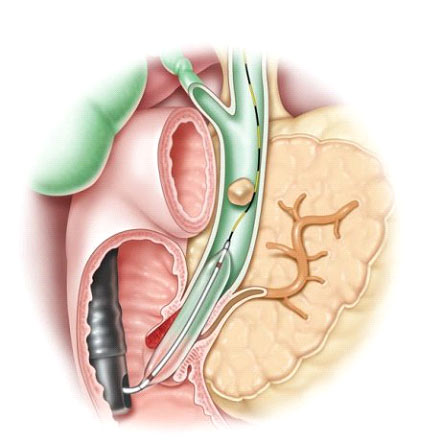Endoscopic Retrograde Cholangio Pancreatography
ERCP is an endoscopic procedure that lets your doctor look into your bile duct to locate stones, strictures (narrowing), infection, or tumors in the bile duct. This test is usually recommended based on symptoms of right upper or mid abdominal pain, jaundice (yellowing of the eyes), fevers, nausea or vomiting. It is also often recommended based on some type of abnormal imaging you have had (ultrasound, CT scan, or MRI).
On the day of the procedure, the Endoscopy Nurse will place an IV into your hand or arm. When it is time for your procedure, you will be brought via stretcher into the endoscopy room. You will be lying on your left side for the procedure. You will be given intravenous sedatives prior to starting your endoscopy, and so most patients are asleep during the test. The nurse will place a plastic shield (‘bite block’) in your mouth to protect your teeth. Most patients do not experience any pain during or after the procedure. In addition, most patients do not recall undergoing the procedure afterward. The ERCP often takes around 30 minutes to perform, but may take as long as an hour and a half.
Your doctor will carefully and safely guide a thin, flexible, fiber optic tube equipped with a light and camera, into your esophagus, then into the stomach, and all the way into the duodenum (first part of the small intestine). The scope used for the ERCP procedure is especially made to look into your bile duct, but is not a great instrument to look at your esophagus or stomach.
During the procedure, Dr Houghton will use small catheters to go into the bile duct, open the entrance, and clean out the duct to remove any stones or debris present. If a stricture (abnormal narrowing) is found during the procedure, he will dilate (stretch) the stricture and will usually place a plastic stent to help keep the stricture from closing off again. In addition, if the doctor finds something abnormal or suspicious during the test, he will likely take brushings or biopsies. After the procedure, Dr Houghton will speak to you and let you know the results of the exam. The nurse may insert a suppository into your rectum after the test. This is standard of care to reduce the risk of pancreatitis after the procedure (not always needed).
Possible Complications
ERCP is generally a very safe procedure. The vast majority of the time, there are no problems during the test. That being said, any procedure that a doctor performs (no matter how safe) can possibly result in unforeseen complications. The possible complications of this procedure include: pancreatitis (inflammation of the pancreas), bleeding, perforation (puncturing the GI tract), and adverse reaction to the IV sedation. In addition, although this procedure is the most accurate way of evaluating the upper GI tract, the doctor is not guaranteed to always find every abnormality during the test.




